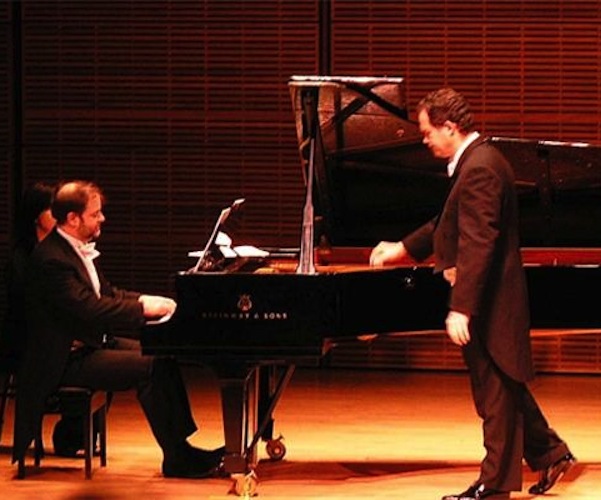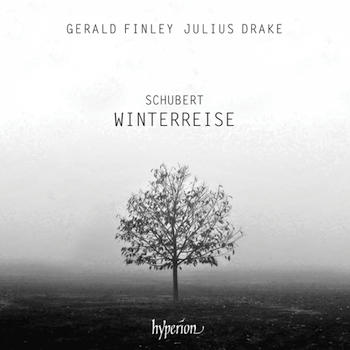Concert Review: A Memorable “Winterreise” From Gerald Finley and Julius Drake
Those of us who have heard Gerald Finley and Julius Drake knew what we were in for – truly beautiful singing throughout every range, and brilliantly expressive piano story-telling.
By Susan Miron
Overheard before bass-baritone Gerald Finley and pianist Julius Drake came on Jordan Hall’s stage: “If this is as good as I suspect it will be, you’ll leave here in a bottomless pit of despair.” Schubert’s heartbreaking Winterreise (Winter Journey) can have that effect. Schubert himself found it both frightening and immensely saddening. He described them (the first twelve) to a friend as “somber” and said these songs had moved him more than any he had composed. The friend recalled Schubert singing these songs “with great emotion… We were all amazed at the melancholy mood of these songs.”
When Schubert accompanied baritone Johann Michael Vogl later that summer, they had to stop because the audience had been reduced to tears. In a YouTube interview, Drake describes it as “a man is jilted, goes on a walking journey during the winter to try and get this out of his system.” But it never leaves his system, and the last song, “Der Leiermann,” described by Finley as “mystical and magical,” makes sure it doesn’t leave our system or memories, as well. Their performance of this iconic work ended especially memorably.
Luminaries of all sorts – pianists, conductors, and singers galore – showed up to hear these longtime collaborators (presented by the Celebrity Series of Boston) perform Winterreise on an appropriately freezing winter’s night last Friday.
For vocalists, there is no peak more treacherous to scale than Franz Schubert’s iconic last song cycle, composed the year before his death at age 31. The two sets of poems, and their vision of an emotional abyss, are set perfectly by Schubert into his cycle of 24 songs. Some of the famous duos that have recorded Winterreise are Dietrich Fischer Diskau and Alfred Brendel; Peter Pears and Benjamin Britten; Thomas Quastoff and Daniel Barenboim. Julius Drake, perhaps the finest collaborative pianist of our time, recorded it first with tenor Ian Bostrich. Acclaimed bass-baritone Gerald Finley and the superb collaborative pianist Julius Drake are the latest to put their stamp on this cycle. A CD of their version will be released by Hyperion in early March.
Those of us who have heard Finley and Drake before knew what we were in for – truly beautiful singing throughout every range, and brilliantly expressive piano story-telling. Many recalled Drake from a beautiful recital he gave here (via the Celebrity Series) with tenor Matthew Polenzani two years ago. He is as mesmerizing a player as a singer could hope to work with, easily up to Winterreise‘s demand for a virtuoso pianist who can create an emotional atmosphere which veers from the frenzied to the utterly hopeless. With all but 5 of its 24 songs set in a minor key, Winterreise is the tale full of classic Romantic imagery, starting with that of a wanderer and a winter journey.
Written four years after Schubert’s Die schöne Müllerin (The Miller’s Beautiful Daughter), Winterreise isn’t so much a narrative as two dozen atmospheric images of despair, longing, frailty revolving around dreams – and the reality – of love unrequited. Then, there is the utter desolation of the road and of the soul; ice, snow, and cold juxtaposed with burning tears; weeping “on my hope’s grave.” Schubert certainly suspected that his time was almost up, and the urgency of writing these songs is reflected in their astonishing emotional and musical depth.
More than one singer has wondered if this hour and a quarter of Weltschmertz is too much to inflict on an audience. But a quite large and enthused audience knew exactly what they had come to hear. They partly came to listen to the artistry of Drake and Finley, the latter a highly respected opera singer known for his performance of roles in Mozart, and recently, for helping to create the role of Robert J. Oppenheimer in John Adams’ Doctor Atomic who created the roles of J. Robert Oppenheimer in John Adams’s Dr. Atomic at the Met and Howard K. Stern in Marc Anthony Turnage’s Anna Nichole at Covent Garden. Together, they gave an exquisite, highly nuanced, very memorable account.
My only regret is that after the last shattering song, the audience felt compelled to jump up and cheer. Walking out slowly and silently into the winter night might have been a better way to honor these two gifted artists.
Susan Miron, a harpist, has been a book reviewer for over 20 years for a large variety of literary publications and newspapers. Her fields of expertise were East and Central European, Irish, and Israeli literature. Susan covers classical music for The Arts Fuse and The Boston Musical Intelligencer. She is part of the Celtic harp and storytelling duo A Bard’s Feast with renowned storyteller Norah Dooley and plays the Celtic harp at the Cancer Center at Newton Wellesley Hospital.


